How Canada’s NAFTA charm offensive hit a wall of confusion and apathy
If Donald Trump tries to cancel NAFTA, no one knows what happens next. But it’s not clear anyone south of the border will stand up for trade.
Canada’s Minister of Foreign Affairs Chrystia Freeland and US Secretary of State Rex Tillerson hold a joint press conference on Parliament Hill in Ottawa, Ontario, December 19, 2017.
Canada and the United States announced Tuesday they will host a summit of foreign ministers in Vancouver on January 16, including envoys from Japan and South Korea, to seek progress on the North Korean nuclear crisis. / AFP PHOTO / Lars Hagberg (Photo credit should read LARS HAGBERG/AFP/Getty Images)
Share
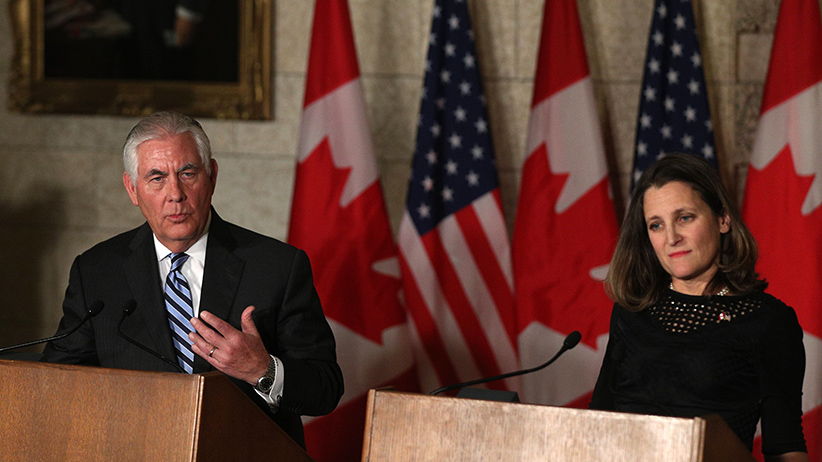
On a sunny September afternoon in Michigan, surrounded by tens of thousands of football fans near the biggest football stadium in America and soon to be awed by a pre-game flyover for Military Appreciation Day, Wayne Easter tailgated for free trade. Easter, a Liberal MP and co-chair of the Canada-U.S. interparliamentary group, had been coaxed to watch the Michigan Wolverines game by Rep. Bill Huizenga, a Republican congressman from western Michigan who’d met a phalanx of Canadian MPs the day before in Windsor. “I didn’t even know what a tailgate party was,” says Easter, who spent the day chatting up American politicians in Ann Arbor, including state Republican leadership, about why NAFTA matters.
Easter asked for a lot of meetings in 2017. As Maclean’s has reported, Canadian officials logged hundreds of meetings with Democrats, Republicans, diplomats and chambers of commerce in every corner of the U.S. in 2017, pounding away at the message that the North American Free Trade Agreement has been a good deal for the continent’s three biggest countries. Documents released via access-to-information peg the official count of individual interactions between inauguration day and an influential midsummer meeting of governors at 600. Foreign Affairs Minister Chrystia Freeland, tapped for her ability to infiltrate Trump’s Washington, met Commerce Secretary Wilbur Ross eight times in six months. So did three other premiers, as well as Innovation Minister Navdeep Bains. Canadians met John Kelly, back when he was homeland security secretary, 13 times. They logged 10 sessions with Sen. John McCain, and eight with Treasury Secretary Steven Mnuchin. The list goes on, and similar meetings extended through the fall into the winter.
Easter most recently spent five days at the end of November in Washington and New York. He met officials at the International Monetary Fund, the World Bank, and the U.S. Treasury Department, sat down with yet more senators and congressmen, and even rang the opening bell at the New York Stock Exchange with colleagues on the House finance committee. Three federal ministers made trips stateside in the first week of 2018. Conservative leader Andrew Scheer will visit Washington days later, flanked by four MPs and coordinated with Freeland’s office. Freeland herself renewed her acquaintance with Ross on Jan. 9.
The greatest challenge, says Conservative MP Erin O’Toole, has been getting power brokers south of the border to care about what’s at stake. “We had great discussions, but NAFTA really wasn’t on the radar of many of the members of Congress and senators we met,” admits O’Toole, who travelled to D.C. with the House finance committee in October. “To be honest, I think anybody from our committee would say … we’re not in the top three.” The massive debate on tax reform loomed large over Washington for much of the fall, stifling most momentum for trade among even ardent advocates in Congress.
Tax reform delayed a high-stakes confrontation over trade that won’t play out until Republicans decide to make NAFTA a top priority. No president has ever tried to unilaterally withdraw from a trade agreement in the U.S., which means President Donald Trump could unleash chaos by attempting to pull the plug on the deal. Legal scholars, trade experts and elected people themselves aren’t sure what role Congress can or will play if the president turns against NAFTA. And that leaves Canada’s rescue-NAFTA squad in an awkward position. The Americans they so heavily lobbied are setting themselves up for a dysfunctional, divisive, cynical debate for which they’re ultimately unprepared.
WATCH: Can Trump kill NAFTA?
Whatever happens next, NAFTA boosters on both sides of the border appear to have underestimated the fight needed to salvage the agreement. Dan Ujczo, a trade and customs lawyer who specializes in Canada-U.S. relations, says the “maple” charm offensive was well-intentioned and realistic. “Canada came in eyes wide open,” says Ujczo, who added the lobbying shored up support among allies in Congress and elsewhere. But it “hasn’t moved the needle” among trade skeptics.
Ujczo, who’s based in Columbus, Ohio, criss-crosses the border frequently to meet clients and sit on panels. He says NAFTA advocates, including the business community, were in “willing denial” and waited too long to take Trump’s tough rhetoric seriously. “We fell in love with the ‘tweak’ language, which ran counter to everything we’d seen on the campaign trail, and everything those of us on the ground in Ohio and Michigan hear every day.”
With U.S. midterms approaching, and a crowded legislative agenda south of the border, time is tight to get a deal done. “We’re at a tipping point right now. We need to see creative solutions,” says Ujczo. “I’m not convinced we’re going to get there.”
It appears a realization is setting in that the charm offensive has not had its desired effect. Canada changed tack to play hardball when it filed a massive complaint against the U.S. at the World Trade Organization that took issue with American countervailing duties slapped on not just Canadian imports, but those of several other major global traders including China and Germany. U.S. Trade Representative Robert Lighthizer reacted swiftly. “Canada’s claims are unfounded and could only lower U.S. confidence that Canada is committed to mutually beneficial trade,” he said in a statement.
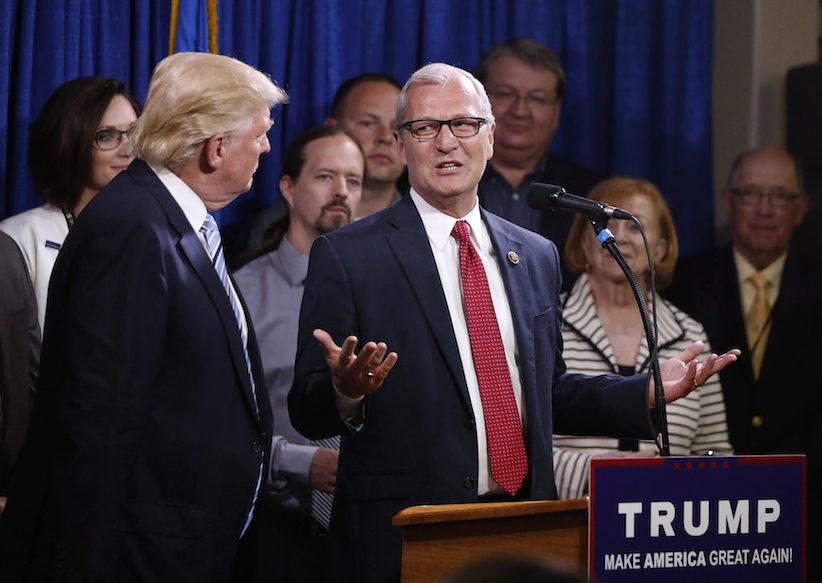
Kevin Cramer is North Dakota’s lone congressman. An early Trump supporter, Cramer co-chairs the northern border caucus. He’s the perfect target for lobbying, and Canadians reported at least eight meetings with Cramer between January and July. He sat down with Natural Resources Minister Jim Carr and Defence Minister Harjit Sajjan, Saskatchewan Premier Brad Wall, Ambassador David MacNaughton, members of the House of Commons defence committee, and a handful of MPs from all parties. Cramer probably met a wider array of Canadian politicians in that time than many Canadian lobbyists. He admits that free trade makes his constituents uneasy, but he cautiously defends the deal. “NAFTA creates a lot of anxiety,” he says. “I also know NAFTA has been a net winner for North Dakota.” As for what happens next, the congressman was at a bit of a loss: “Everybody’s waiting for what it is we need to react to.”
If Trump moves to terminate NAFTA in 2018, that’s when the Canadian charm offensive is supposed to pay off as congressional allies stand up to the president. But even if enough Republicans and Democrats scraped together the political will to salvage the trade deal, it’s not clear they have the power to pull it off. While the rules allow any NAFTA partner to walk away with enough notice, experts disagree about which branch of government in Washington has final authority. If Congress asserts itself and challenges the Trump administration, the answer may ultimately come from the Supreme Court—and that prospect has lawyers running through several decades of relevant federal law with a fine-tooth comb.
Crystal-clear rules governing withdrawal are lacking in the U.S. Trade Act of 1974, the law that underpins that country’s trade policy. The North American Free Trade Agreement Implementation Act, which Congress passed in 1993, doesn’t help much. And the trade promotion authority law, which granted the president power to fast-track negotiations most recently in 2015, offers no decisive clarity. Stephen Claeys, former trade counsel to the powerful House ways and means committee that has jurisdiction over international trade, says no one has ever conceived of a deal worth leaving. “I just don’t think people envisioned the U.S. withdrawing from an agreement,” he says. “There are folks in the administration and elsewhere who’d say that’s part of the problem.”
The U.S. Constitution offers no clear guidance. Experts who say the president has the final call point to the section that affirms his right to make treaties. Meanwhile, those who side with Congress point to the section that gives the legislative branch powers “to regulate commerce with foreign nations.” Even if the president triggers a withdrawal, he can’t repeal the NAFTA implementation law unilaterally; only Congress has that power. Cramer hinted that a showdown in the courts is certainly a possibility. “We’ve been determined to have standing if we think there’s a constitutional violation in the separation of powers,” he says. “I’m not advocating for that necessarily, but there are a lot of people who feel strongly about NAFTA.”
The deal may have its champions who will eventually consider their legal options to stymie Trump’s agenda, but it’s not clear that Congress is prepared to unite to save the deal—nor that it will be a priority. O’Toole, a former veterans affairs minister* who also ran for the Tory leadership last year, recalled a meeting with a Florida congressman on the northern border caucus. The Canadians hoped to talk to him about trade, but that conversation didn’t go as planned. “I’ll be very frank. His only real concern in that meeting was the case of the student that was removed from the McGill student council in a case of perceived anti-semitism,” he says. On that committee trip, O’Toole said North Korea and the Iran nuclear deal both dominated more than Canada-U.S. trade. Even Cramer is unsure about when NAFTA will take centre stage. “I don’t know that it matters enough to enough people. The question is, are we preparing ourselves?” he says. “Does this get priority or does infrastructure become the next big priority? Or some other big issue?”
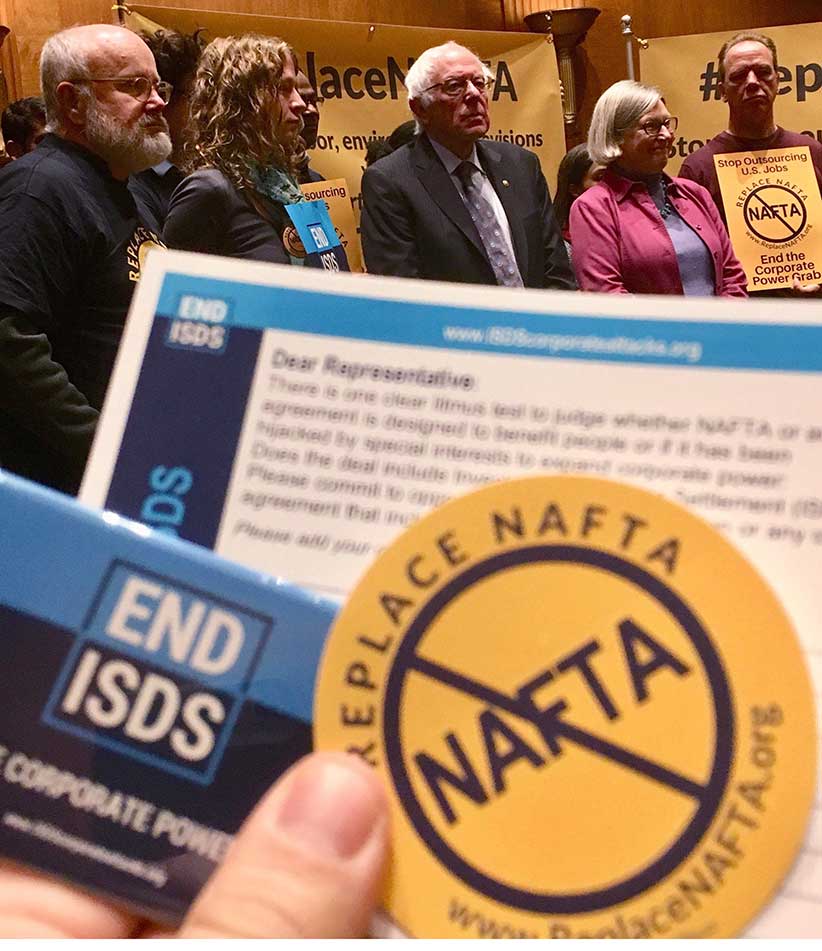
Congressional leaders opened 2018 with competing priorities: they have to deal with a relatively urgent negotiation on domestic spending in order to avoid a government shutdown within the month. House Speaker Paul Ryan hopes to take on entitlement reform, including medicare, this year. And immigration reform, from the future of the Deferred Action for Childhood Arrivals program to the president’s persistent desire for a wall at the Mexican border, is never far from the headlines.
Gary Clyde Hufbauer, a senior fellow at the Peterson Institute for International Economics who’s watched international finance and trade policy issues for 40 years, thinks Congress will wake up when Trump triggers withdrawal. “As soon as he utters termination, this will galvanize the Congress,” he says. “There is a pretty vigorous feeling that Congress should reclaim its power over trade policy, even amongst the protectionists in Congress, among whom there are quite a few. They don’t want the president to go off and do everything on his little lonesome self.”
Hufbauer’s optimism isn’t contagious. Midterm elections, and politics, get in the way. Claeys doubts many Democrats, especially those in the midwest and upstate New York, will make a lot of noise in an election year. “It might break well for them for taking a position against the president, but then they have their own constituencies who are also trade skeptics,” he says.
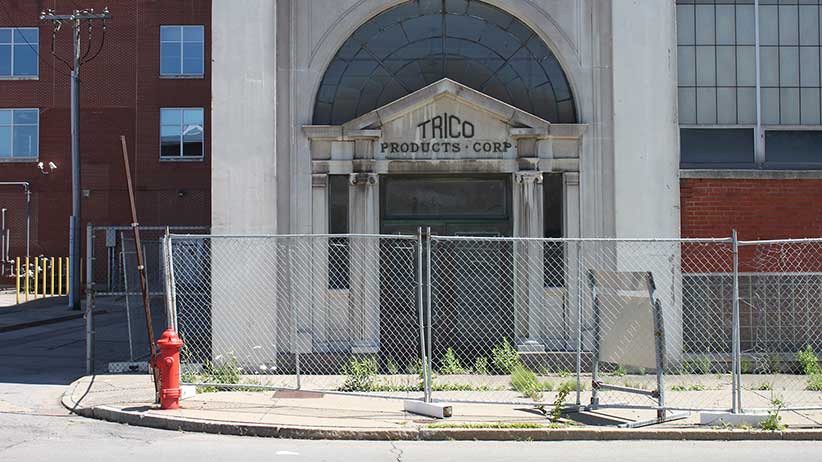
Brian Higgins is a seven-term Democratic congressman from Buffalo, N.Y.—and an ardent trade skeptic. “I have opposed every trade agreement that we’ve seen before us since having been elected to the United States House of Representatives,” he says proudly. Higgins, another co-chair of the northern border caucus who happens to sit on the influential ways and means committee, heaps praise on his Canadian neighbours. He credits them with filling the Bills football stadium and the Sabres hockey arena, not to mention suburban outlet malls. His NAFTA quarrel isn’t with Canada; it’s with the country to the south. “Windshield wipers were founded in Buffalo,” he says. “And for 75 years they were all made in Buffalo. Now they’re all made in Mexico.”
Higgins had recently sat beside Ambassador MacNaughton at a dinner hosted by the Mexican ambassador to the United States. They traded stories of steel towns, MacNaughton reminiscing about his hometown of Hamilton, and Higgins recalling Buffalo’s once mighty Bethlehem Steel. Those twin struggles point to a common cause. “We need a bilateral strategy between the United States and Canada to bring Mexico to a level of reality” on labour and environmental standards, says Higgins. But don’t expect him to defend the existing trade deal when he’s on the campaign trail later this year. NAFTA doesn’t win votes. “For a young manufacturing worker in Canada or the United States who was 25 years old back in 1994, and is considerably older today, they’re probably underemployed today,” he says. “There is a deep resentment towards the promise of free trade and the reality of free trade.”
READ: Inside Canada’s plan to stop Trump from ripping up NAFTA
That resentment evaporates on the other side of the country. Congressmen and senators in the southern border states support NAFTA because they share in the Mexican prosperity boosted by the agreement. Rep. Kenny Marchant, a Texan congressman who represents a suburban district sandwiched between Dallas and Fort Worth, wrote in a July op-ed in the Dallas Morning News that NAFTA “helps our family budgets go further with lower costs on the household products we use every day,” in addition to offering farmers and ranchers improved market access. Wide swaths of states in the country’s agricultural heartland, which has seen its share of trade quadruple since 1994, have risen to NAFTA’s defence. Last June, 17 senators wrote a letter to Lighthizer, the U.S. trade representative. The signatories included the agriculture committee chair, Republican Sen. Pat Roberts, and 15 other Republicans. In the letter, the senators expressed “strong support” for a modernized NAFTA. “We request that you avoid any revisions to NAFTA … that would diminish the opportunities for U.S. farmers and ranchers to export their products, particularly given the current depressed state of the agriculture economy.”
The skeptics and the defenders, of which there is no shortage in both parties, will struggle to find a happy medium.
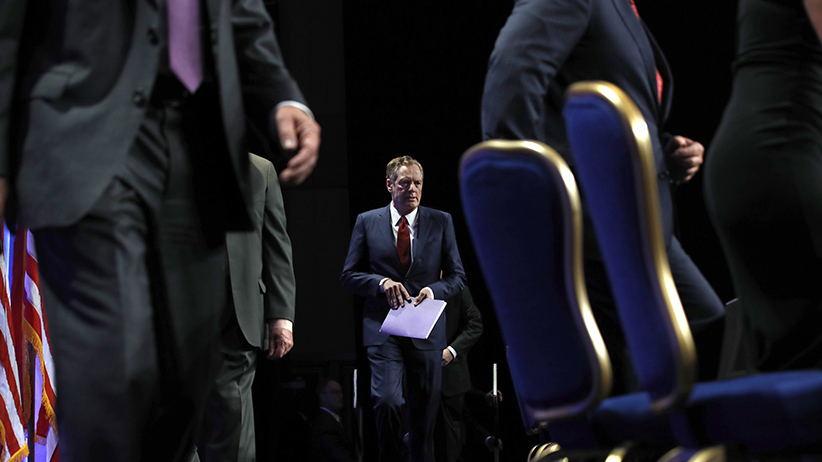
Of course, triggering withdrawal could simply be a bargaining chip. Hufbauer predicts the president has no real interest in disrupting trade. “Once he actually raises tariffs or otherwise interrupts supply chains, there’ll be a lot of dislocation in the United States. A lot of people will lose their jobs because their factories close,” he says. “Trump will want the best of the political play, but not the economic disruption.”
Trump’s administration may pursue a similar tack at the WTO, which the president has claimed was “set up for the benefit of everybody but us.” Indeed, the U.S. has already vetoed the appointment of new judges to the dispute resolution panel that settles global trade disputes. But Lighthizer, a fierce critic of that dispute resolution process, sometimes softens his tough talk at the WTO. At a ministerial meeting in December, Lighthizer’s brief opening statement made reference to “serious challenges” within the institution. By the end of the summit, he’d heralded it as a “moment when the impasse was broken,” and expressed a desire to “pursue a fresh start” with like-minded nations. There’s logic to the rhetoric. Packing up and leaving the WTO would expose American exporters to higher tariffs—and Congress would need to pass an unlikely bill supporting that effort, too. A global trade war might play well with beleaguered rust belt voters, but in practice would bring its own pain to the world’s biggest economy, not to mention its political process.
As he and his parliamentary partners try to sort out the signal from the noise in Congress, Easter admits some meetings are tinged with overconfidence on the other side of the table. “In some cases, a certain American arrogance will come through. No denying that. I see that often,” he says. “But we’re equal players, and we’ve got to come at it from that perspective.” The charm offensive is seemingly never-ending, and Canadians are obsessed with winning over Americans who aren’t yet sure how to collectively confront the future of continental trade. In this courtship, however, only one side is fighting for a long-term relationship. And Team NAFTA may realize it’s already too late to save free trade.
CORRECTION, Jan. 12, 2018: This post originally stated Conservative MP Erin O’Toole is a former international trade minister. In fact, O’Toole is a former veterans affairs minister.
MORE ABOUT NAFTA:
- Canada abstains from UN vote rejecting U.S. embassy move to Jerusalem
- Justin Trudeau on trade, pot and Die Hard’s status as a Christmas movie
- Trump tells rally about trade-balance disagreement with Trudeau
- The 91 most important economic charts to watch in 2018
- Canada braces for a Trump visit in 2018
- Why Trudeau will be his best advertisement—and worst enemy—in 2018
- What the end of NAFTA could mean for jobs in western Canada
- Trump’s heartland biggest losers if NAFTA collapses, says business group